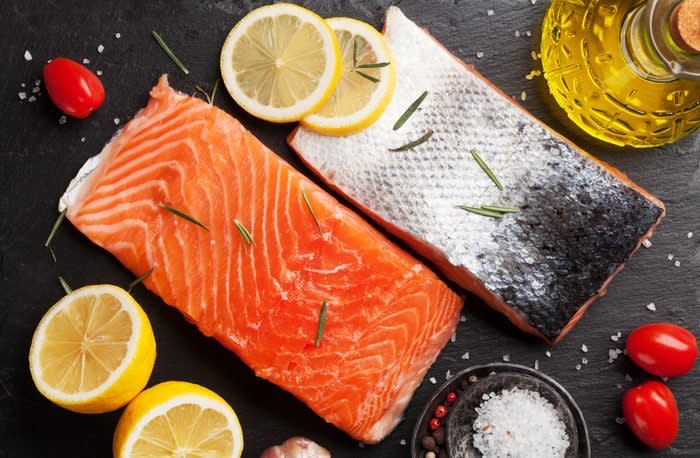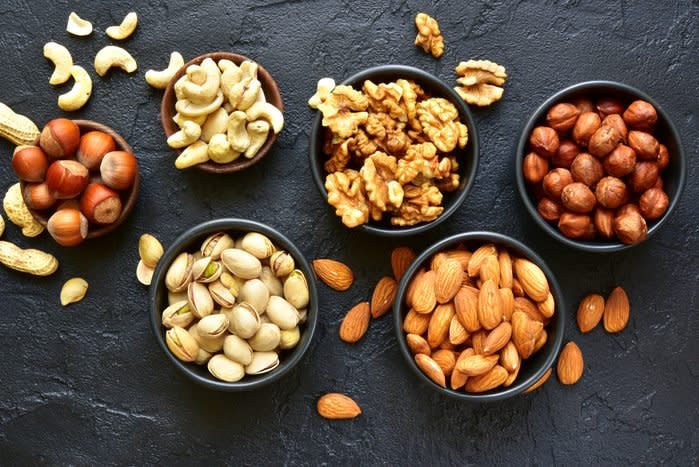The Ultimate List of Heart-Healthy Foods
There’s a lot you can do to show your heart some love. The American Heart Association recommends making certain lifestyle changes to improve your risk factors for cardiovascular disease. Specifically, manage your blood pressure, quit smoking, control cholesterol, reduce blood sugar, exercise, lose excess weight and eat a balanced, healthy diet.
But what, specifically, should you eat for optimal heart health? Certain foods can affect blood pressure, cholesterol, triglycerides and inflammation—all risk factors for heart disease. Here’s our expert-recommended heart-healthy foods list.
Vegetables

No matter the color, all vegetables are good for you. For instance, orange, red and yellow veggies—rich in carotenoids, fiber and vitamins—deserve a spot on your plate. But leafy greens, in particular, pack an extra nutritional punch, as they’re chock-full of good-for-you vitamins, minerals and antioxidants. They’re a good source of vitamin K (which helps improve arterial function) and contain dietary nitrates (which help lower blood pressure). Add veggies to healthy soups, stir-fries, casseroles and salads.
Acorn squash
Asparagus
Bok choy
Broccoli
Carrots
Collard greens
Kale
Mustard greens
Red peppers
Romaine lettuce
Spinach
Sweet potatoes
Swiss chard
Tomatoes
Fruit

“Eat the rainbow” works for both fruits and vegetables! But different fruits contain different nutrients, which is why it’s important to consume a variety. For instance, orange-colored fruits contain a good amount of beta-carotene, magnesium and potassium (which can blunt the effect of sodium). And berries are loaded with calcium, folate, iron, manganese, potassium and vitamins A and C. Mix diced fruit into yogurt and smoothies, add fruit to your cereal, or grab fresh fruit for an on-the-go snack. You can even “mash” certain fruit (like avocados, which offer heart-healthy monounsaturated fats, aka “good fats“) and use as a sandwich spread.
Apples
Avocados
Bananas
Blackberries
Blueberries
Boysenberries
Cantaloupe
Oranges
Papaya
Peaches
Raspberries
Strawberries
Whole Grains
Ditch the refined grains (like white bread and white rice) and opt for whole grains instead (like rye bread and brown rice). Packed with fiber, whole grains can help lower cholesterol, reduce systolic blood pressure and decrease your risk for heart disease. Make sure the label says 100 percent whole grain. Popcorn counts as a whole grain but keep it healthy by air-popping it and skipping the butter and salt. Add herbs for flavor!
Barley
Bulgur
Brown rice
Buckwheat
Farro
Millet
Oats
Rye
Quinoa
Whole wheat
Fish

Loaded with omega-3 fatty acids, fatty fish can help lower blood pressure, improve arterial function and reduce levels of total cholesterol, triglycerides and blood sugar. The American Heart Association recommends eating two to three servings of fatty fish per week.
Albacore tuna
Herring
Mackerel
Salmon
Sardines
Trout
Legumes
As a terrific, low-fat source of fiber, B vitamins and plant-based protein, legumes (think beans, lentils and peas) help satiate you in a healthy way.
Adzuki beans
Black beans
Chickpeas
Kidney beans
Pinto beans
Red, green and brown lentils
Nuts

Rich in fiber, vitamins and minerals, such as magnesium, copper and manganese, nuts provide another great plant-based protein source. Eating walnuts, in particular, can help reduce blood pressure, decrease inflammation and lower LDL (low-density lipoprotein, the “bad” cholesterol) and total cholesterol levels.
Almonds
Cashews
Peanuts
Pecans
Walnuts
Seeds
As another plant-based source of omega-3 fatty acids, seeds pack a lot of nutrition in a tiny package. Their omega-3s, for instance, help lower levels of triglycerides, LDL and total cholesterol and decrease blood pressure.
Chia seeds
Flaxseeds
Pumpkin seeds
Sesame seeds
Sunflower seeds
The post The Ultimate List of Heart-Healthy Foods appeared first on Taste of Home.
